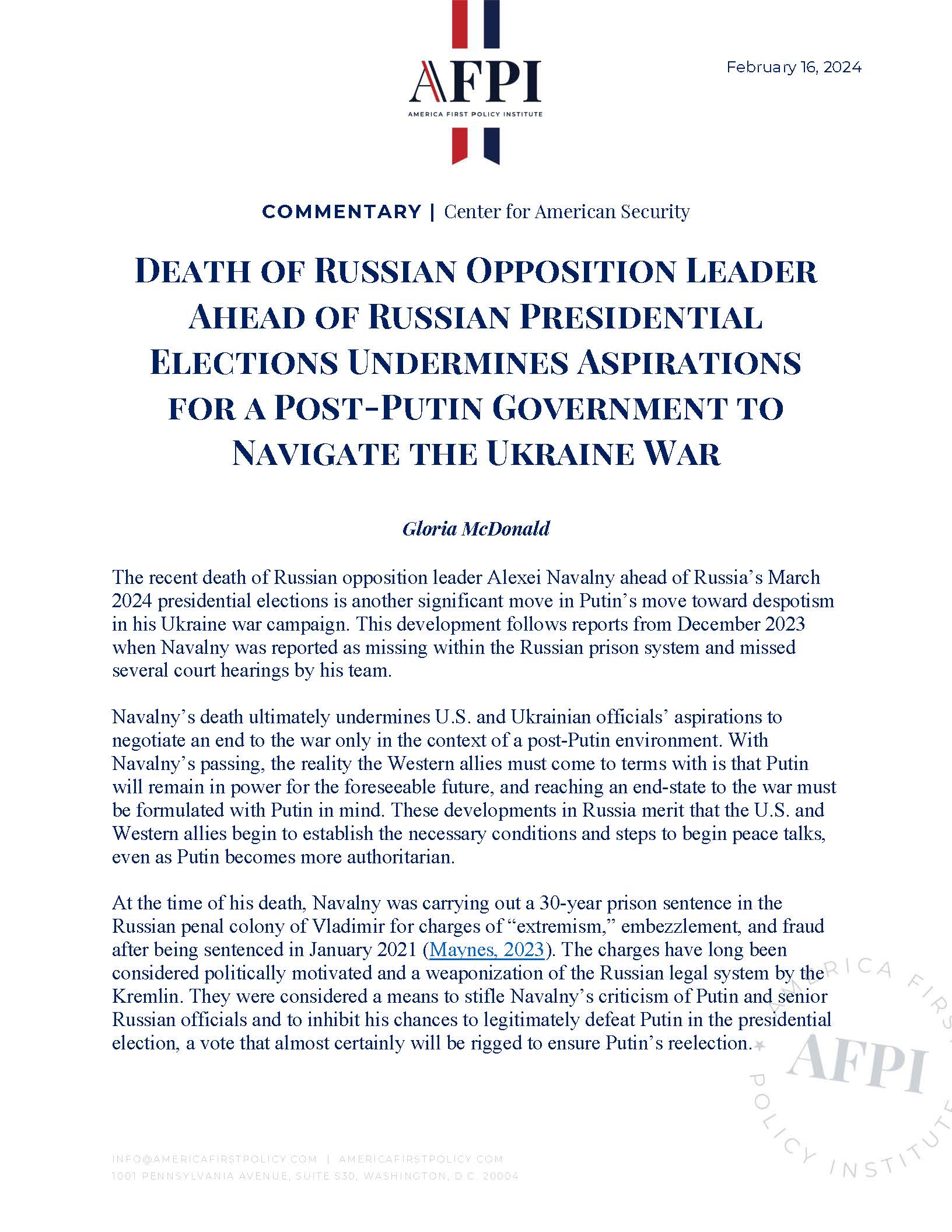Death of Russian Opposition Leader Ahead of Russian Presidential Elections Undermines Aspirations for a Post-Putin Government to Navigate the Ukraine War
The recent death of Russian opposition leader Alexei Navalny ahead of Russia’s March 2024 presidential elections is another significant move in Putin’s move toward despotism in his Ukraine war campaign. This development follows reports from December 2023 when Navalny was reported as missing within the Russian prison system and missed several court hearings by his team.
Navalny’s death ultimately undermines U.S. and Ukrainian officials’ aspirations to negotiate an end to the war only in the context of a post-Putin environment. With Navalny’s passing, the reality the Western allies must come to terms with is that Putin will remain in power for the foreseeable future, and reaching an end-state to the war must be formulated with Putin in mind. These developments in Russia merit that the U.S. and Western allies begin to establish the necessary conditions and steps to begin peace talks, even as Putin becomes more authoritarian.
At the time of his death, Navalny was carrying out a 30-year prison sentence in the Russian penal colony of Vladimir for charges of “extremism,” embezzlement, and fraud after being sentenced in January 2021 (Maynes, 2023). The charges have long been considered politically motivated and a weaponization of the Russian legal system by the Kremlin. They were considered a means to stifle Navalny’s criticism of Putin and senior Russian officials and to inhibit his chances to legitimately defeat Putin in the presidential election, a vote that almost certainly will be rigged to ensure Putin’s reelection.
Navalny first rose to prominence in 2010 for his anti-corruption reform work in Russia. His anti-corruption foundations uncovered and reported a litany of corruption by Russian officials, including by Putin. Navalny went on to launch a presidential bid in 2016, which generated further domestic opposition to Putin.
Navalny was effective in organizing opposition to the Putin regime through social media and his blog. This made him difficult to silence and to be regarded as a significant threat by Putin to his regime.
As likely retaliation by the Kremlin for his exposés and growing support behind his political campaign, Navalny was poisoned with the nerve agent Novichok in August 2020. The Kremlin denied any involvement in this and in other attacks and provocations against Navalny. Navalny received treatment for this poisoning in Germany in 2020. He returned to Russia in 2021 and was immediately arrested.
Russia’s presidential elections are set for March 2024. With Putin’s crackdown on political dissent—including that of Navalny, his allies, and other opposition leaders in Russia—Putin has manufactured circumstances to eliminate protests to a rigged election to return him to power until 2030.
Putin’s likely return to power in 2024 will undermine the belief by many U.S. and Ukrainian officials that negotiations to end the Ukraine war can begin only with a post-Putin government.
President Zelensky has been outspoken about his opposition to negotiating with Putin. In September 2022, President Zelensky said, “Ukraine will not hold any negotiations with Russia as long as Putin is the president of the Russian Federation. We will negotiate with the new president” (Agencies, 2022). President Zelensky solidified this position in a presidential decree that made it “impossible” for any future Russia-Ukraine peace talks to include President Putin. Zelensky asserted that Russia-Ukraine peace talks would be considered only in a post-Putin government (Reuters, 2022). He affirmed his position during his recent visit to Washington, D.C., saying “Putin does not need peace. How can I negotiate with Putin?” (Gerashchenko, 2023).
The Biden Administration’s position on negotiations has been expressed through its phrase “nothing about Ukraine, without Ukraine.” This refers to the idea that Ukraine should determine the time and circumstances in which negotiations with Russia are considered.
The recent death of Navalny is a stark reminder of the brutal and corrupt methods Putin has deployed to retain his position of power. Navalny’s passing will likely spur further domestic opposition within Russia against Putin and therefore lead to more aggressive measures by Putin to suppress domestic opposition.
